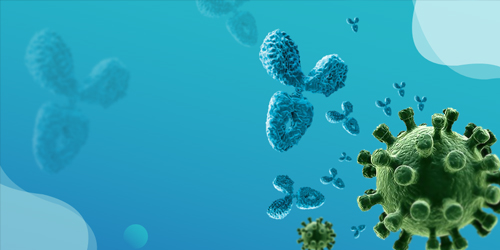Complement Regulatory Proteins Genetic Disorders Therapeutic Strategies Related Services Related Products Q&A Resources
The complement system plays a major role in host protection against invasive pathogens, in maintenance of organism’s
homeostasis, and in immune complex processing. Involved in more than 40 zymogens, receptors and regulators, the
complex system can be activated via 3 separate activation pathways which appear at different times in
evolution: the classical, alternative, and lectin pathways.
Every step of the enzymatic cascade is under strict regulation to avoid excessive or insufficient activation. In
immune reactions, two activation pathways appear before the evolution of the adaptive immune system, because they do
not require antibody for initiation. Three pathways come together to activate C3, the principle opsonic protein of
the complement cascade, and all continue together to the generation of membrane attack complex (MAC) for lysis of
apoptotic/necrotic cells and microbes.
Genetic Disease
The indispensable role of complement system in immune system reveals that any deficiency in complement proteins may cause increased susceptibility to a variety of
diseases, such as genetic disease. Usually, the complement defects are rare due to the rigorously genetic control,
while defects in the proteins in circulation and on cell membranes that downregulate complement to limit
uncontrolled inflammation are more common. These deficiencies can be inherited or acquired.
The typical complement related genetic disorder is angioedema, which is characterized by nonpitting edema of the
dermis and subcutaneous layers. The acute, recurring, and self-limiting edematous episodes can occur on face,
extremities, trunk, upper airways, genitals or the gastrointestinal tract, in which airway swelling is
life-threatening. Hereditary angioedema and acquired angioedema are the common branches and both are closely
associated with complement components.
Complement Regulatory Proteins
Complement Regulatory Proteins
The complement system is an essential component of the innate immune response, targeting pathogens, exacerbating
inflammation, and mediating host defense through a series of protein hydrolysis activation steps. Although the
complement system is powerful, its uncontrolled activation can lead to tissue damage and immune dysregulation.
Complement regulatory proteins are essential regulators that fine-tune this cascade of responses, ensuring host
protection without collateral damage.
|
Regulator Types
|
Complement Regulatory Proteins
|
Mechanism of Action
|
|
Circulating complement regulators
|
C1 Inhibitor (C1-INH)
|
Classical pathway regulation: C1-INH binds to activated C1r and C1s within the C1 complex (C1qC1r2C1s2), irreversibly inhibiting their
activity and preventing the downstream cleavage of C4 and C2.
|
|
Lectin pathway regulation: Similarly, C1-INH inhibits the mannose-binding
lectin-associated serine proteases (MASPs), blocking their ability to activate C4 and C2.
|
|
Factor H
|
Competition with Factor B: Factor H competes with Factor B for binding to C3b, effectively inhibiting the formation
of the alternative pathway C3 convertase (C3bBb).
|
|
Cofactor activity: Factor H serves as a cofactor for Factor I, facilitating the proteolytic degradation of C3b to
iC3b, an inactive fragment incapable of further propagation in the cascade.
|
|
Surface selectivity: Factor H preferentially binds to host cell surfaces that express
sialic acid and glycosaminoglycans, distinguishing host cells from pathogens and ensuring selective
regulation.
|
|
Membrane-bound complement regulators
|
Decay-accelerating
factor (DAF)
|
Convertase dissociation: DAF accelerates the decay of C3 and C5 convertases (C3bBb and
C4b2a, respectively) by displacing their enzymatic subunits (Bb or C2a). This disruption halts the
cleavage of C3 and C5, thereby inhibiting the downstream cascade.
|
|
Membrane cofactor protein (MCP, CD46)
|
Cofactor role: MCP binds C3b and C4b deposited on cell surfaces, enabling Factor I to cleave these components into inactive
fragments (iC3b and C4d).
|
|
Protection of host cells: By facilitating the inactivation of C3b and C4b, MCP prevents
further propagation of the cascade on host cells, shielding them from complement-mediated damage.
|
|
CD59 (Protectin)
|
MAC inhibition: CD59 binds to C8 and C9 during MAC assembly, blocking the polymerization of C9 into the
pore-forming structure. This action prevents the formation of a functional MAC, thereby protecting host
cell membranes from lysis.
|
Genetic Disorders Associated with Defects in Complement Regulatory Proteins
Complement regulatory proteins play a critical role in maintaining immune homeostasis by preventing excessive or
misdirected complement activation. Dysregulation of this finely
balanced system usually stems from genetic mutations or the presence of autoantibodies and may have profound
biological and pathological consequences.
C1-INH is a serine protease inhibitor that regulates the classical complement pathway by inhibiting the protein
hydrolyzing activity of C1r and C1s. Its deficiency
leads to hereditary angioedema (HAE). On the other hand, autoantibodies can neutralize C1-INH function and actually
reproduce the defective state despite normal C1-INH gene expression. This is often observed in acquired angioedema
(AAE).
Hereditary Angioedema
HAE is a rare disorder, which belongs to the group of bradykinin-mediated angioedemas. HAE-induced edema can
affect the face, the extremities, the trunk, and the genitals. In the gastrointestinal tract, angioedema may
mimic an abdominal catastrophe, whereas in the upper airways, it may cause obstruction leading to
suffocation. There are two main types of HAE.
-
Hereditary angioedema with complement C1-INH deficiency (C1-INH-HAE)
-
Hereditary angioedema with normal C1-INH function (nC1-INH-HAE)
C1-INH can inhibit activation of C1 to regulate the complement, coagulation, and fibrinolytic plasma enzyme
cascades. The deficiency of C1-INH leads to the uncontrolled, spontaneous activation of C1, and to the
consumption of C4 and C2. nC1-INH-HAE is often due to a mutation of the factor XII (F12) gene, which results
in the increased functional (amidolytic) activity and can escape inhibition by the C1-inhibitor.
Acquired Angioedema
Similar to HAE, AAE can also cause serious and potentially fatal attacks of subcutaneous and submucosal
edemas of upper airways, facial structures, abdomen, and extremities, due to inadequate control of BK
generation. The main etiology is similarly due to C1-inhibitor deficiency (C1-INH-AAE).
As a key correlation factor in the pathomechanism of genetic disease (HAE and AAE), complement has been
studied as an important diadynamic criteria, and is beneficial to predict the severity of diseases.
Therefore, the complement components have become an attractive therapeutic target for genetic disease.
Research Frontiers and Novel Therapeutic Strategies
The current state of treatment for C1-INH-related genetic disorders is characterized by well-established alternative
therapies that provide critical relief and some cutting-edge innovations that open new horizons. The integration of
gene therapy, targeted small molecules and precision biologics promises to address the limitations of current
approaches.
|
|
Therapies
|
Mechanism of Action
|
|
Alternative Therapies
|
Plasma-derived and Recombinant C1-INH Therapies
|
Restoration of functional C1-INH suppresses protease activity, rebalancing the kallikrein-kinin system
and the complement pathway.
|
|
Kallikrein Inhibitors
|
Therapies targeting plasma
kallikrein, a key mediator in bradykinin generation, have gained traction as indirect strategies
to address C1-INH deficiency. These inhibitors offer a targeted approach with minimal complement
interference.
|
|
Bradykinin Receptor Antagonists
|
Icatibant, a selective bradykinin B2 receptor antagonist, directly counteracts the hyperactivity of
bradykinin signaling pathways in C1-INH-deficient conditions.
|
|
Cutting-edge Innovations
|
Gene Therapy
|
Recent advancements in gene-editing technologies, including CRISPR-Cas9, present opportunities for
addressing genetic defects in SERPING1.
|
|
Small Molecule Inhibitors
|
Small molecules targeting upstream complement proteins (e.g., C1q
or MASP-2) could prevent excessive complement activation while sparing the broader immune response.
|
|
Bi-specific Antibodies and Fusion Proteins
|
Innovative biologics combining complement inhibition with anti-inflammatory properties are under
exploration, including engineered constructs targeting multiple pathways implicated in C1-INH
deficiencies.
|
Complement Test Services
Creative Biolabs has extensive experience in complement testing, providing clients with a full range of testing
services to help develop new complement-targeted therapies to inhibit or enhance complement function in a research
setting, and to determine the efficacy and potency of complement-targeted drugs. We have a robust and standardized
testing platform, scientists experienced in developing complement assays and expertise in a variety of different
technologies and methods to provide fast, reliable, objective and easy-to-interpret results.
Our services include:
Related Products
Our comprehensive complement platform offers a great number of complement-related products in a rapid and
cost-effective manner. If you are interested, please feel free to contact us for more
details.
|
Cat.No
|
Product Name
|
Purity
|
Applications
|
|
CTA-756
|
Mouse Anti-Human Cl Inhibitor Mono-
clonal Antibody
|
≥95%
|
ELISA; WB; IP
|
|
CTA-058
|
Anti-Complement Factor H Monoclonal
Antibody
|
≥95%
|
WB; IP
|
|
CTA-620
|
Mouse Anti-Human Factor H Monoclonal
Antibody [Biotin]
|
≥95%
|
ELISA
|
|
CTA-331
|
Rabbit Anti-Human Complement Factor
H Polyclonal Antibody
|
≥95%
|
WB; IHC
|
|
CTP-360
|
Native Human C1 Inhibitor Protein
|
>95% by
SDS-PAGE
|
ELISA, Functional
Assays
|
|
CTP-033
|
Recombinant Human
Complement 1 Inhibitor
|
≥95% by
SDS-PAGE
|
Activity Assays
|
|
CTP-111
|
Recombinant Human Complement
Factor H Protein-6His tag
|
95% by
SDS-PAGE
|
Bioactivity Assays
|
|
CTP-458
|
Native Human Complement
Factor H Protein
|
>95% by
SDS-PAGE
|
ELISA, Functiona
Assays
|
|
CTS-001
|
Guinea Pig Complement Serum
|
-
|
Hemolytic plaque assays; Complement fixation assays;
lymphocytotoxicity and hemolytic procedures.
|
|
CTS-003
|
Rat Complement Serum
|
-
|
Hemolytic plaque assays; Complement fixation assays;
lymphocytotoxicity and hemolytic procedures.
|
|
CTS-005
|
Human Complement Serum (Single Donor)
|
-
|
Hemolytic plaque assays; Complement fixation assays;
lymphocytotoxicity and hemolytic procedures.
|
|
CTS-011
|
Mouse C57BL6 Complement Serum
|
-
|
Hemolytic plaque assays; Complement fixation assays;
lymphocytotoxicity and hemolytic procedures.
|
|
CTS-014
|
Goat Complement Serum
|
-
|
Hemolytic plaque assays; Complement fixation assays;
lymphocytotoxicity and hemolytic procedures.
|
Resources
For Research Use Only.
Related Sections:



